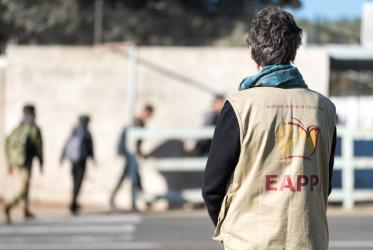Rev. Dr Owe Boersma will take over the post of EAPPI international programme coordinator in Geneva, effective 26 September 2016. Mr Manuel Quintero, after eight years of service as EAPPI international programme coordinator based in Geneva, has reached retirement age and will be leaving the World Council of Churches’ EAPPI international office at the end of August.
As Owe Boersma considers his goals for leading the Ecumenical Accompaniment Programme in Palestine and Israel (EAPPI), one word that comes to his mind is “equilibrium.”
Keeping equilibrium in his new job will be a challenge, Boersma acknowledges, but he’s inspired on both personal and theological levels to meet that challenge.
He will, he says, “continue to see how the faith of Israel is theologically the tree on which we are planted, and on the other hand, never forget that a whole people - the Palestinians - suffer injustice.”
Each day, he prays for peace in Jerusalem, “in the comprehensive, visionary way” described in Isaiah 56:7.
“I will bring them to my holy mountain of Jerusalem and will fill them with joy in my house of prayer. I will accept their burnt offerings and sacrifices, because my temple will be called a house of prayer for all nations.”
Boersma first studied theology at the Theological University of the Reformed Churches in the Netherlands, where he specialized in church history, especially the Reformation.
He and his wife, Rev. Hedda Klip, have both taught at the Presbyterian Theological Seminary in Kumba, Cameroon, as well as at the Evangelical Theological Seminary in Cairo, Egypt.
Boersma also worked with the former Basel Mission (now mission 21) as a programme officer for Sudan and Tanzania and team coordinator for Africa. Most recently, he worked with Evangelisches Missionswerk in Deutschland (Association of Protestant Churches and Missions in Germany), serving as executive secretary for Africa and the Middle East.
In looking back on places in which he has lived — Africa, Egypt, Switzerland and Germany — Boersma considers each “a great privilege and an enormous learning experience.”
In his new role with the WCC, he hopes to combine these international experiences with local church life, since being part of a church community, preaching in services, and explaining about what is going on in Christianity worldwide belong together from his perspective.
“A cloud of witnesses”
Boersma recalls moments in his life when he was surrounded by the ecumenical movement in ways that moved him.
When he was living in Cameroon, he celebrated the Week of Prayer for Christian Unity in January with daily church services in the evenings, followed by a joint service in the town center with a host of churches.
“A second, very moving moment was when I was in the first year in the mission house in Basel, and a reunion took place with hundreds of people who had been missionaries in Cameroon, like my wife and me. It was a touching experience of belonging to a ‘cloud of witnesses,’ all working for helping and advancing people far away from their homes, as pastors, doctors, agriculturalists, teachers, male, female and children.”
The WCC welcomes Boersma, while thanking Quintero for his many years of dedicated service. May they have every blessing in their new roles, as they continue to journey with the ecumenical movement.
Facts:
The Ecumenical Accompaniment Programme in Palestine and Israel (EAPPI) is a concrete response to an appeal to the World Council of Churches from church leaders in Jerusalem in 2002. They wrote in a letter: “We would respectfully request protection of all people in order to assist the re-establishment of mutual trust and security for Israelis and Palestinians. Further, we would call on all peace-loving people from around the world to come and join us in a manifestation for just peace”.
Over 70 churches, ecumenical bodies and specialized ministries in 22 countries from Africa, Asia, Europe, North America and Latin America actively participate in the programme. Almost 1,500 accompaniers have participated.
An accompanier must be at least 25 years old but not yet 70, have experience working with people, and speak English fluently. Three recommendations are required in order to be accepted. The assignment is three months long; accompaniers work in international teams and live in places such as Hebron, Jericho and Jerusalem.
WCC member churches in Israel and Palestine
Ecumenical Accompaniment Programme in Palestine and Israel
Statement on the Israeli-Palestinian Conflict and Peace Process, 28 June 2016









